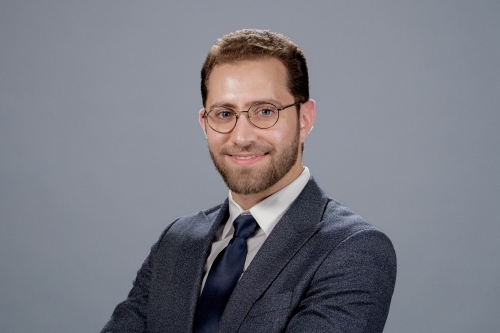"I wear two hats, one as an engineer and another as a data scientist. But in fact, I am motivated by the idea of bringing data science to Civil and Environmental Engineering. It's such a neat combination to analyze data and link it contextually to solve challenges in our field."
We are kicking off a new Spotlight Series where we highlight a CEE department member and share their personal stories, work, and interest in Civil and Environmental Engineering. Our first feature story covers Mohamad Hallal, who will join the department as an Assistant Teaching Professor in January! Please give him a warm welcome and find out more about his expertise below:
Compiled by Pooja Nerkar
What got you into Engineering?
I was interested in things that seemed unnatural to me. As a kid, earthquakes were one of these occurrences that intrigued me, and I often wondered why do earthquakes happen? Why does the ground shake? I had no idea my career would one day revolve around earthquakes- and utilizing multidisciplinary tools to mitigate their impact on society.
What is your educational background?
I started my academic journey as an engineer. In 2017, I earned my B.E. in Civil and Environmental Engineering from the American University of Beirut. While working toward my B.E., I spent one semester as an exchange student at the University of New Mexico and another semester doing research at the University of Illinois, Urbana-Champaign. My exchange semester was one of the best semesters of my undergraduate experience, and my research experience was my first time working in the earthquake engineering field.
I then joined the University of Texas at Austin and completed my M.S. and Ph.D. in Civil Engineering in 2019 and 2022, respectively. While working toward my Ph.D., I felt there was a missing link, especially considering the amount of uncertainty I had to deal with as an engineer and the volume of data I was working with. So I decided to pursue another M.S. in Statistics and Data Science, which I completed in 2019. I say I wear two hats, one as an engineer and another as a data scientist, but in fact, I am motivated by the idea of bringing data science to civil and environmental engineering.
What sparked your interest in Civil Engineering and teaching?
The surge of data in our field is creating opportunities to study the link between the environment, built systems, and human activities in previously impossible ways. However, we continue to face challenges in answering pertinent questions in our field, such as those related to aging infrastructure, natural hazards, sustainable and resilient systems, and equitable access to these systems. Integrating modern data science tools with our engineering and physics-based knowledge is the key to transforming our field to respond to the world's most pressing challenges. On top of that, I was always interested in teaching and interacting with students. I remember when I was still in middle school, I would play the role of a teacher with my siblings, explaining simple linear algebra concepts. That was a significant drive for me to pursue a Ph.D. to become a teacher and hopefully educate future engineers.
All of this drives my overarching teaching goal: to equip future engineers with state-of-the-art tools and skills that combine data and computation with civil and environmental engineering so that they can be leaders in the dynamic and global workforce.
What challenges do you hope to address through your role at UC Berkeley?
Our field is undergoing a quiet revolution, which is fueled by the proliferation of data and technological developments. As educators, it is our responsibility to transform the learning experience so that all future civil and environmental engineers are ready for this digital transformation. My goal is to demystify data analytics and machine learning so that no student gets baffled by these advancements.
We have the strength to transform our field to respond to the most pressing challenges. At the University of California, Berkeley, I aim to match this perspective by transforming the learning experience to the broader benefit of a resilient, equitable, and globally connected society.

